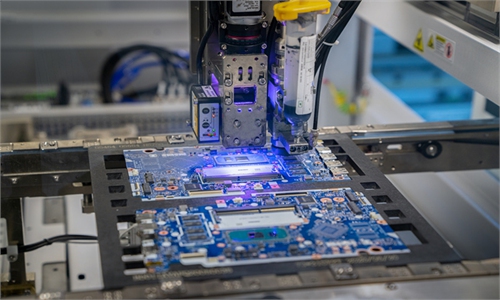
A worker tests semiconductor chips in a factory in Yancheng, East China's Jiangsu Province, on April 14, 2023. Photo: VCG
Chinese Commerce Minister Wang Wentao called on Japan to correct wrongdoings in restricting exports of semiconductor-related manufacturing equipment to China, which has severely violated international economic and trade rules, according to a statement from the Ministry of Commerce (MOFCOM) on Monday.
Wang's remarks were made during his talks with Japanese Trade Minister Yasutoshi Nishimura on Friday at the 29th Asia-Pacific Economic Cooperation (APEC) trade ministers' meeting held in Detroit, US, on May 25 and 26.
"Japan's insistence on rolling out the export controls severely violates international economic and trade rules, which hurts the development foundation of the industry," Wang said, urging Japan to help maintain the stability of global industrial chains.
China, the world's largest semiconductor consumption market, enjoys advantages in upstream raw materials, components and packaging, and it has abundant application scenarios, while Japan has an upper hand in advanced chipmaking equipment and associated hardware integration.
The Japanese restrictive measures, in lockstep with US' technology "decoupling" moves, will wreak havoc on Japanese manufacturers, which have shipped many semiconductor-related products to China, experts said.
After two months of public consultation, during which some Japanese industry groups and companies expressed opposition and concerns, the Japanese government on May 23 announced 23 items of chipmaking equipment will be added to the export control list, which is expected to take effect on July 23.
In a quick response, a spokesperson for the MOFCOM said the move is an abuse of export control measures. China reserves the right to take measures to safeguard its own legitimate rights and interests.
During the public consultation period, Chinese industries submitted comments and a number of industry associations issued public statements opposing the move.
In April, China filed a lawsuit against Japan over its export controls, as Chinese representatives at the WTO requested a review of the US-led restrictive agreement with its allies to contain China's semiconductor sector.
Chinese representatives required US, Japan, and the Netherlands to notify the WTO of the reported agreement that was reached in January by the three countries to limit exports of advanced chipmaking tools to China.
The US Department of Commerce's Bureau of Industry and Security announced in October last year an extensive list of regulations that restricted chips made using American tools from being exported to China. The Biden administration is also asking its allies to help undercut China's ability to make advanced chips.
The Netherlands said in March it was planning new restrictions on exports of semiconductor technology to protect national security, Reuters reported, although it did not name China.
Despite the challenges caused by geopolitical tensions, China is ramping up efforts to accelerate the improvement of supply chains such as those for semiconductor manufacturing equipment and materials, Xiang Ligang, director-general of the Beijing-based Information Consumption Alliance, told the Global Times.
With huge market advantages and systemic economic advantages that are able to mobilize a large amount of resources, the independent innovation of China's chip industry will accelerate, Xiang noted.
During the talks with the Japanese trade minister, Wang also condemned the G7 for using issues concerning China to smear and attack the country.
"It is hoped that Japan could correct its perception of China, and promote the stable development of bilateral economic and trade ties in a constructive manner," Wang said.
Despite Japan's moves against China's semiconductor sector, China is still willing to work with its neighbor in promoting cooperation in key areas of the economy and providing a fair, transparent and predictable business environment, according to the Chinese commerce minister.

